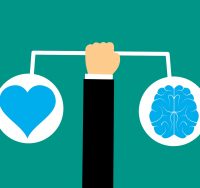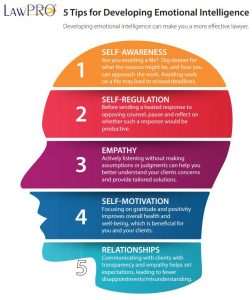Emotional intelligence: the essential skill for the workplace and life

The concept of emotional intelligence isn’t new but has seen exponential growth over the years and is said to be the essential skill in the workplace and in our personal lives.
We’ve all heard about the dichotomy of the heart and mind – it is at the centre of the concept of emotional intelligence. Stopping to think about what we are feeling prevents emotions taking charge of our behaviour.
- navigate social complexities and manage conflict
- overcome challenges
- empathize with others
- lead and motivate others
- improve overall physical and mental health by reducing stress and anxiety
- communicate effectively and forge stronger relationships
Building emotional Intelligence: 5 Practice Tips
Growing your emotional intelligence will take time, critical self-reflection and intentional effort. But the journey can be transformative.
Daniel Goleman, the leader in the field, sets out a number of EI components:* Everyone can continuously work to enhance their EI skills. Here are 5 tips that you can practice.
- Emotional self-awareness – awareness of one’s own feelings, and an understanding of how those feelings can impact others
- Self-regulation – managing one’s own emotions and predicting their effects before acting on them
- Empathy – sensing and understanding the emotions of others
- Motivation – persevering through obstacles, with a growth mindset
- Social skills – managing relationships, inspiring others and eliciting favourable responses from them
1. Enhance self-awareness
Pay attention to your emotions with mindfulness. If you are feeling a strong emotion, name the emotion and ask yourself why you might be experiencing it; what’s causing it? By identifying emotions, you can lessen their power over you and manage them better. By acknowledging feelings, you can think logically about solutions.
How this helps your legal work: If you find yourself avoiding a file, dig deeper and try and think about what the reasons might be, and how you can approach the work. For example, are you nervous because you are afraid that the client won’t be satisfied? Afraid to start because you don’t understand the instructions? Avoiding the file because you are having difficulty managing your client relationship? Avoiding work on a file may lead to missed deadlines. Having a checklist with a tickler system can help with completing tasks on time.
2. Focus on self-regulation
The way we think and feel are intertwined. Thoughts can help regulate emotions, and balancing emotion with logic can help curb the instinct to act upon a strong emotion. Compare what your emotions are driving you to do against what logical reasoning is concluding. Are emotions clouding your judgment or are there holes in the logic?
Also, when feeling upset, take a break to calm yourself down and be very aware of how you act. Practice deep breathing – it tricks the brain to calm down.
How this helps your legal work: Before sending a heated response to opposing counsel, pause and reflect on whether such a response would be productive, and in your or your client’s best interests.
3. Build empathy
We interact with people in many aspects of our lives. Putting yourself in someone else’s shoes, actively listening to them and thinking about their perspective can help you examine your own perspective.
To empathize with someone doesn’t mean you have to completely understand them – it’s about accepting them for who they are – especially when you don’t understand them. You learn to value their existence. When you empathize with other people, you can evoke a more positive response.
How this helps your legal work: Actively listening without making assumptions or judgments can help you better understand your clients concerns and help with formulating follow up questions to fill in any gaps.
4. Practice self-motivation
Emotionally intelligent people think more positively with a growth mindset and practice resilience during challenging times. This helps to stay motivated while also motivating others.
It’s important not to underestimate the power of attitude. Our attitudes affect the people around us and can be infectious.
People who convince themselves that failures are due to something they can change don’t give up easily. They continue to try and learn and believe that success depends on their own actions.
Practising gratitude can boost your happiness and increase your positivity.
How this helps your legal work: Seeking out mentors and networking with others in your community provides many benefits during challenging times. You and your families also have free access to the Member Assistance Program (“MAP”) – a confidential service to help you achieve your health and wellness goals.
5. Managing relationships
Understanding your own emotions and what drives your behaviours is a step towards working well with others. Body language and nonverbal communications can also play a role in relationship management. Your body language should match your words. Conversely, if you learn how to read other people’s nonverbal communication, you can plan your response accordingly.
Conflict is inevitable and can arise in any relationship. Resolving conflict in a constructive way can help build trust and strengthen relationships. When disagreeing with someone, point out exactly what you think should have been done, but also highlight what was done well. When conflict isn’t perceived as an attack, it fosters creativity.
How this helps your legal work: When communicating with clients, be transparent and empathetic. A detailed retainer letter setting out what you will (or will not) do is a good tool to manage your clients’ expectations. The same principles of constructive communication apply to other members of your firm.
How stretching your emotional intelligence muscles can make you a more effective lawyer:
- Examining any strong emotions and slowing down before reacting leads to more efficiency and lessens the chance of misunderstanding
- Self-awareness can help counter procrastination, resulting in not missing deadlines
- Empathy and active listening can help you understand your client’s concerns more deeply to provide tailored solutions
- Clear and transparent communication helps set expectations, leading to fewer disappointments/misunderstanding
- Focusing on gratitude and positivity improves overall health and well-being, which is beneficial for you and your clients
Take a look at some resources available for free from the Member Assistance Program such as eCourses on resilience, responsible optimism, resolving conflict, and taking control of your mood.
Curious about your EI and skills you can build? Explore some of these tests
- Mind tools (free; under two minutes)
- IHHP (free; two minutes)
- Psychology Today (45 mins; receive a free snapshot report, with the option to purchase a detailed report for $9.95 USD. The full report sets out strengths, limitations and action steps)
- 6seconds.org – Brain Brief profile (10 minutes; $10 USD, gives you a snapshot of your brain’s current style for processing emotional and cognitive data, and comes with a free “Brain Brief Interpretation Guide,” an e-book about Brain Styles)
* Daniel Goleman, Emotional Intelligence, 10th ed (New York: Bantam Dell, 2006).


Leave a Reply